Root Canal Therapy – Weatherford, TX
Don’t Fear the Root Canal!
Root canal therapy is actually a much easier procedure than you might think. In fact, treatment is largely comparable to receiving a dental filling, a treatment that is widely accepted as simple and easy to complete! At Beacon Dentistry of Weatherford, our talented doctors put your comfort first and foremost, take all the steps to save your tooth, and make sure that you’re fully informed on every step of treatment before we begin. To relieve discomfort caused by your damaged tooth, give us a call for root canal therapy in Weatherford, TX!
Why Choose Beacon Dentistry of Weatherford for Root Canal Therapy?
- Fun and Relaxing Dental Office for Families
- Sedation & Soft Tissue Laser Dentistry
- Experienced Team of Dental Professionals
Common Misconceptions about Root Canal Therapy

If you are told that you need to have a root canal performed, you should know that therapy is meant to relieve your discomfort, not cause it. In fact, any pressure, pain, or sensitivity that you’re feeling will be completely removed once you undergo treatment and finish the healing phase. This means you’ll be able to eat the foods you want, save your natural tooth from extraction, and cover your tooth with a highly detailed crown. It’s the best way to give your tooth a second chance!
Do I Need Root Canal Therapy?

Root canal therapy becomes necessary when damage or infection affects the innermost layer of a tooth, the soft tissue known as the pulp. This can occur after an injury or when a cavity is allowed to penetrate deep into your dentition. When the sensitive pulp experiences problems, you may notice numerous signs and symptoms, possibly including:
- An extremely painful, throbbing toothache that interferes with your daily activities
- A pimple-like bump on your gums
- A tooth that is darker than the ones around it
- Visible signs of damage to the tooth
- Extreme dental sensitivity to hot and cold that lingers even after the source of the temperature change is gone
The Root Canal Process

The root canal procedure usually goes something like this:
- We make sure you are comfortable. We will numb your tooth and may administer sedation as well. Our goal is for you to feel little to nothing throughout your appointment.
- We use special instruments to access your tooth’s pulp and remove damaged tissue. We also remove the tooth’s nerve so it can no longer send pain signals to your brain.
- We fill in the tooth with a special material called gutta-percha.
- We place a temporary crown to protect the tooth while a laboratory fabricates a permanent one.
The Benefits of Getting a Root Canal

Patients who undergo root canal therapy often experience numerous benefits, including:
- Freedom from pain. A successful root canal treatment can permanently end your toothache.
- Long-term function. Your root canal may allow your tooth to continue functioning normally throughout the rest of your life.
- Easy maintenance. Protecting your treated tooth should be simple. Excellent oral hygiene and routine dental visits are both important.
- A complete smile. Often, root canal therapy can prevent a tooth extraction and spare patients from the embarrassment of an incomplete smile. It can also prevent the need for you to pay for a dental implant or another form of tooth replacement.
Understanding the Cost of Root Canals

The cost of root canal treatment in Weatherford varies from case to case, since every situation is inherently different. That said, we should be able to provide you with an accurate estimate once we’ve taken a closer look at your situation. Though it might seem a little expensive at first, you should know that root canals are incredibly cost-effective—plus, they let you keep your natural tooth! Our team is also more than happy to help make sure that you’re using your dental insurance, in addition to other provisions, to make your care cheaper. For additional information or assistance, call today and let us know how we can help!
Factors That Can Affect Root Canal Cost

These three main factors generally affect the cost of getting a root canal:
- Location and Type of Tooth – Your molars (back teeth) are more complex in terms of structure than your front teeth, meaning it’s often a little more expensive to perform root canals on them.
- Case Complexity – In most cases, we can perform your root canal right here in our Weatherford office. However, if things have progressed and complex treatment is necessary, it might require two appointments and/or the help of a specialist.
- Additional Services – You’ll probably need a dental crown after your root canal; this restoration will add to your total bill.
Is It Cheaper to Pull My Tooth?

It might seem like it’d be cheaper to forgo a root canal and opt to have the tooth extracted instead; however, this isn’t going to be a cost-effective solution at all! Root canals allow your natural tooth to healthily remain inside your mouth—but having a tooth extracted means that you’ll also need to have it replaced, to prevent serious complications like dental drift, bite misalignment, and bone resorption in your jaw. Tooth replacement isn’t always cheap, especially if you’re opting for a premium solution. Granted that root canals can provide decades of oral health benefits, it’s a fiscally sensible choice, in addition to being the best option for your smile.
Does Dental Insurance Cover Root Canal Treatment?

It’s common for most dental insurance plans to provide coverage for root canal treatment. Many plans classify it as a major procedure, meaning that you might receive anywhere from 50% to 80% of the total cost covered, assuming you’ve met your annual deductible. That said, since every dental insurance plan is different, you’ll want to closely review and familiarize yourself with the details of your own policy so that you aren’t hit with any surprises. Our team is well-versed in the finer points of dental insurance, so we’re more than happy to take a closer look at your plan with you and ensure that you’re making the most of your coverage.
Other Options for Making Root Canal Treatment Affordable

Our team understands that dental treatment comes with financial implications, and root canals are no exception. However, we’re committed to working closely with you to ensure that you’re able to get the care you need without worrying about the burden on your wallet. In addition to working with numerous insurance providers, we’re thrilled to offer third-party financing options such as CareCredit, Scratchpay, and Wisetack Lending, all of which will allow you to pay for your treatment in more manageable chunks. We also offer an in-house savings plan that can grant you access to numerous benefits, including discounts on services such as root canal treatment.
Root Canal FAQs
Why Do I Need a Root Canal if My Tooth Doesn’t Hurt?
Since pain is one of the most common symptoms, this is a fair question. The short answer is that a throbbing sensation or pain when biting down aren’t the only warning signs of serious dental damage. In fact, once the nerve of the tooth has been “killed” by the infection, it’s very likely that you won’t experience pain at all – for now, at least. For all of these reasons, it’s important to consider other common symptoms that root canal treatment is needed, such as a pimple-like bump on your gums near the tooth.
How Much Pain is Normal After a Root Canal?
While the procedure itself will be completely painless thanks to powerful numbing agents, it is completely normal to experience some soreness during the healing process. Usually, it’s relatively minor and subsides completely within a few days. During this time, we recommend avoiding crunchy foods, getting lots of rest, and taking OTC pain medication as needed. If the pain is persistent or worsens after three days, then inform our Weatherford dental team right away.
Can Root Canals Be Prevented?
The large majority of the time, yes! To keep your teeth healthy and infection-free, we strongly encourage our patients to commit to a solid oral hygiene routine at home, which includes brushing for a full two minutes each morning and evening and flossing daily. Of course, you should also schedule a checkup and cleaning with our Weatherford dental team every six months as well. Lastly, steer clear of smoking, nail-biting, and other unhealthy habits that can damage your teeth and gums.
Can I Take Antibiotics Instead of Getting a Root Canal?
No, you can’t take antibiotics instead of getting a root canal. The main reason is that antibiotics travel through the bloodstream, which does not reach the pulp of your tooth. Therefore, the only solution is treatment from a dentist.
What Happens if You Wait Too Long for a Root Canal?
Many patients contemplate waiting in hopes that their tooth will heal on its own. Simply put, the opposite happens. Instead of the root of the problem going away, it will progress, spreading deeper into your tooth as well as your surrounding teeth and gums. It’s also important that we mention that your overall health can be negatively impacted if the harmful bacteria spreads to other parts of your body, like your vital organs. So, don’t put off root canal treatment. The sooner you schedule it, the better!
I Need a Checkup & Cleaning I am Looking for a Dentist for My Child I am Concerned about Bleeding Gums I Have a Cavity or Broken Tooth I am Missing One or More Teeth I am Unhappy with My Smile I Want a Straighter Smile I am Scared of the Dentist I am in Pain & Need Help View Our Services

